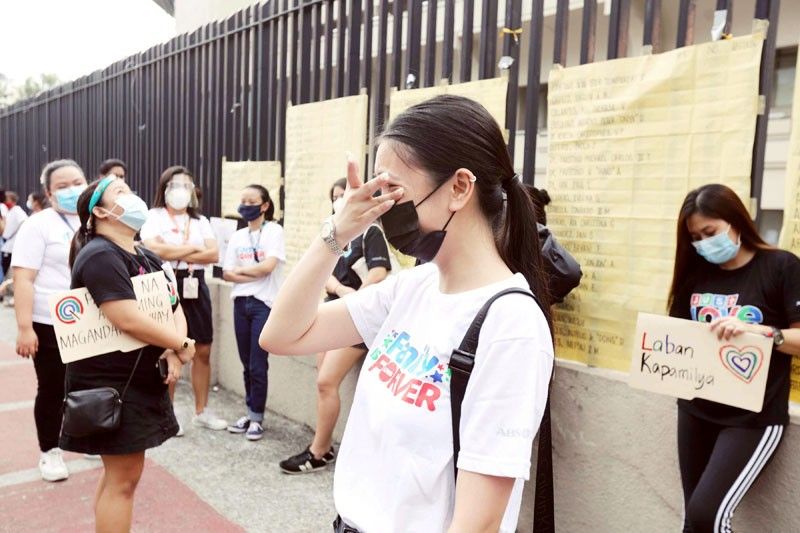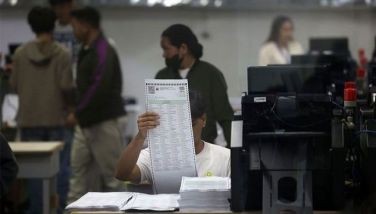Explainer: The oligarchy in the Philippines is more than just one family or firm

MANILA, Philippines — President Rodrigo Duterte's recent claim to have dismantled the oligarchy in the Philippines has raised eyebrows as well as questions, chief among them: Is it true?
This is not the first time that the president has voiced disdain for oligarchs, but what is the oligarchy, really, and was the president correct in his framing of the ABS-CBN franchise denial?
Duterte has long made it clear that he has an ax to grind with the nation's oligarchs, framing them as a covert cabal engaging in corporate malfeasance and egregious business practices.More extreme instances have seen him mention the Ayalas as well as Manuel V. Pangilinan in past speeches.
During a visit to military troops in Jolo, Sulu days after a House panel voted to junk the franchise bid of ABS-CBN Corp., the chief executive was quoted as saying in Filipino: “Without declaring martial law, I destroyed the people holding the economy, crushing, and not paying [taxes.] They take advantage of their political power."
RELATED: Hontiveros to government: You dismantled the lives of ordinary workers, not oligarchs
The Palace denied that the president was talking about the Lopezes of ABS-CBN, although reports soon surfaced that the Palace communications team had edited certain portions of the president's past addresses.
Who are the oligarchs?
The Greek philosopher Aristotle described oligarchy as a political rule that does not aim to forward the public's welfare with the end of justice in mind but instead involves a small political class ruling in and for its own interest.
Later on in the early 20th century, Italian sociologist Robert Michels in his 1911 book, Political Parties, posited that even democracies have a tendency to turn into oligarchies.
Speaking in an interview over ANC, Ronald Mendoza, economist and dean of the Ateneo School of Government, said that the term refers to a group of people or families holding control over the economy or an entire nation. He was also careful to point out that not all wealthy families qualify as oligarchs.
"All the evidence and indicators suggest that we are more oligarchic today than we have been in the past...What we're also seeing is a weakening of the rule of law and a discouraging of foreign investment. Because you are sending a signal that you are not exactly strengthening institutions in the process," Mendoza said of the president's sweeping claim.
"In fact, it has become a very personalistic attack against not the firms, but actually the individuals who own them. So what this does is it creates an uncertain environment where if you don't allow yourself to the powers that be, your firm or your conglomerate may be targeted," he added.
"In his public comments, President Duterte has emphasized specific problematic characteristics of oligarchs—they obtain government contracts using political connections, and they engage in illegal activities to gain an advantage such as insider trading," Mendoza also wrote in an opinion column carried by Rappler, where he pointed out that the country’s richest have experienced a significant uptick in wealth over the past five years.
'Oligarchs can't end oligarchy'
A briefer written by members of the faculty of the Ateneo de Manila Department of Political Science argued that oligarchs can't end oligarchies, saying the president is "simply making some oligarchs more powerful than other oligarchs."
"A clear indication of an oligarchic system is the prevalence of political dynasties in Philippine politics. Political families are by design meant to perpetuate themselves in power...Duterte’s public attacks and moves against the oligarchy are selective at best and duplicitous at worse; he has, in fact, encircled himself with his oligarch-allies and friends," they wrote.
Roque says President Duterte was referring to Lucio Tan and water concessionaires when he mentioned "oligarchs" in his speech in Sulu @PhilippineStar @PhilstarNews
— Alexis B. Romero (@alexisbromero) July 14, 2020
Besides the chief executive, there are three other Dutertes in elective government positions.
House Speaker Alan Peter Cayetano, who wrote a lengthy and impassioned essay on Facebook accusing the Lopez family of being oligarchs and of being lower than terrorists, also has four relatives holding government positions. His wife, former mayor of Taguig, is a member of the House of Representative as congresswoman for a separate legislative district in the city.
"To date, it is estimated that a significant bulk of the country’s economy and social spheres are controlled and influenced by a few hundred upper-class families. President Duterte has not weakened this ‘control of the few’. He has simply embedded himself in his preferred set of oligarch-friends," the Ateneo political science professors said.
Mendoza said that ending the concentration of power among the country's elites cannot be done by going after specific families and firms. "[T]he best way to end oligarchy in the political system for political dynasties or in the economy for business, the best way is to increase competition," he said.
"He should focus on the political concentration of power and see that many political dynasties are now proliferating and expanding. According to our data, they have not been fatter than they have ever been before. They are now much more expanded than before," he added.
READ: Duterte: Voters want political dynasties to remain | Political dynasties crumble; Estrada clan shut out
Senators slam 'dismantling oligarchy' comment
For Sen. Francis Pangilinan, though, it is dealing with the COVID-19 pandemic and its resulting hunger and loss of jobs that are the more pressing problems that confront millions of Filipinos now, and not oligarchs.
"The problem of the oligarchs is made up. Closing ABS-CBN had nothing to do with the more serious problem of COVID. The problem of oligarchs was invented to deceive the people because in reality, they did not show the slightest good result in suppressing the widespread COVID, the hunger and unemployment of millions of our countrymen," he said in a statement.
RELATED: 'Dismantling oligarchy' means fewer dynasties, stronger parties — Drilon
His sentiment was echoed by fellow opposition lawmakers Sen. Franklin Drilon and Sen. Risa Hontiveros.
"It's not true that the oligarchy has been dismantled. What has been dismantled are the lives of ordinary workers. We should be solving the crisis right now instead of adding to it...I used to work in the media. But more than that, I'm a Filipino united with other Filipinos who are upset, distraught and afraid of what tomorrow might bring," Hontiveros said in a mix of Filipino and English.
Drilon meanwhile said that Duterte's claim of "dismantling the oligarchy" can only be brought about by "structural reform and an overhaul of existing laws that allowed the oligarchy to persist," also cautioning that without such reforms, the unseating of oligarchs would only make room for cronies.
The Merriam-Webster Dictionary defines "oligarchy" as "a government in which a small group exercises control especially for corrupt and selfish purposes." pic.twitter.com/8rcZc281Q8
— Philstar.com (@PhilstarNews) July 14, 202
Peasant group: 'Oligarchs still very much in power'
Militant peasant group the Kilusang Magbubukid ng Pilipinas in an earlier statement also said there is no truth to the president's claim that he has managed to dismantle the oligarchy, saying the claim is a delusion.
"Oligarchs and rich families are still very much in power and in control of the social wealth, the national economy, and remain decisive in government policies," said KMP chairperson Danilo Ramos. "In fact, Duterte coddles and protects oligarchs as he benefits from their patronage."
The group also accused Duterte of "creating his own breed of cronies."
He equated the oligarchs to the Philippines' top one percent.
"The Lopezes, Pangilinans, and even the Ayalas are also among the oligarchs. While 99% of the population reel from the staggering socio-economic effects of the pandemic, this 1% have their wealth intact, are barely scathed, and even continue to rake in profits. Even big landlords and landgrabbers thrive under Duterte," the KMP leader added.
— Franco Luna with a report from Bella Perez-Rubio
Editor's Note: Manuel V. Pangilinan is chief executive officer of PLDT. A unit under PLDT's media conglomerate has a majority stake in Philstar Global Corp., which runs Philstar.com. This article was independently produced following editorial guidelines.
- Latest
- Trending


































